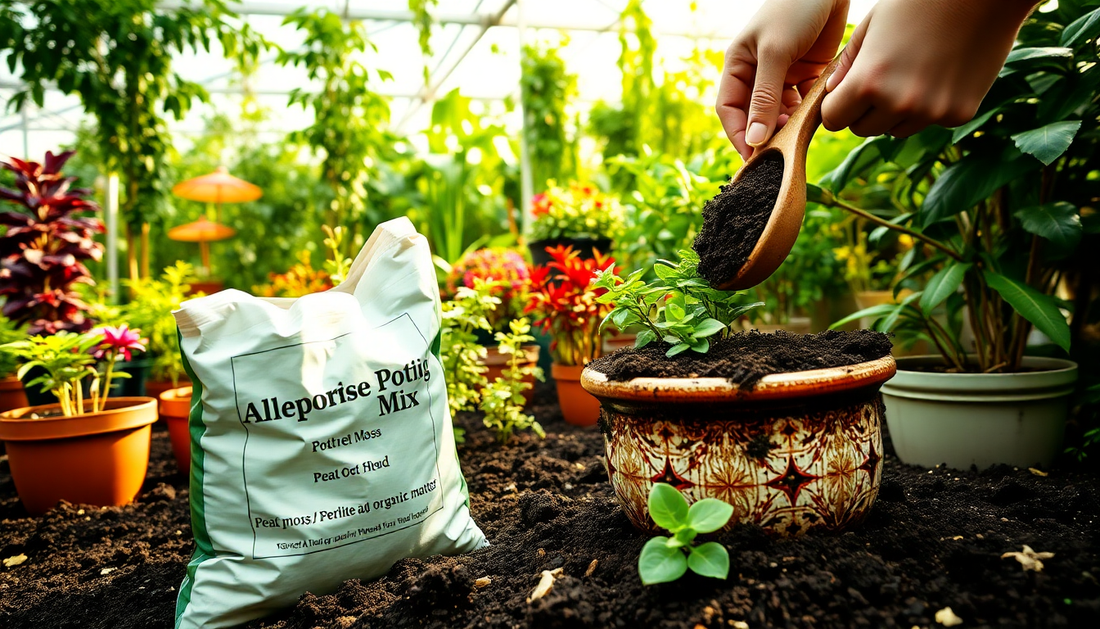
All-Purpose Potting Mix: Does It Work for All Plants?
Share
As a passionate gardener, I've always been intrigued by the concept of all-purpose potting mix. The idea of a single soil blend that can cater to a wide variety of plants is undoubtedly appealing, but the question remains: does it truly work for all plants? In this comprehensive blog post, we'll delve into the world of all-purpose potting mixes, exploring their benefits, limitations, and whether they're a one-size-fits-all solution for your gardening needs.
Understanding All-Purpose Potting Mix
All-purpose potting mix, also known as universal potting soil, is a versatile soil blend designed to accommodate a wide range of plants, from houseplants to outdoor annuals and perennials. These mixes are typically composed of a combination of ingredients, such as peat moss, compost, perlite, and vermiculite, which work together to provide the necessary nutrients, aeration, and water-holding capacity for plant growth.
The appeal of all-purpose potting mix lies in its convenience and versatility. Gardeners can purchase a single bag of this soil and use it for a variety of plants, eliminating the need to research and purchase specialized mixes for different plant types. This can be especially useful for those with limited space or a diverse collection of plants.
Evaluating the Pros and Cons
When it comes to all-purpose potting mixes, there are both advantages and disadvantages to consider. Let's take a closer look at the key factors:
Pros:
- Versatility: As the name suggests, all-purpose potting mixes are designed to work well with a wide range of plants, from vegetables and herbs to houseplants and outdoor flowers.
- Convenience: With a single soil blend, gardeners can simplify their potting and repotting tasks, saving time and effort.
- Nutrient-rich: Many all-purpose mixes are formulated with a balanced blend of nutrients to support plant growth.
- Lightweight: These mixes are often lighter in weight compared to garden soil, making them easier to work with and transport.
- Improved drainage: The inclusion of ingredients like perlite and vermiculite can enhance soil drainage, reducing the risk of waterlogging.
Cons:
- One-size-fits-all approach: While all-purpose mixes aim to be versatile, they may not be optimized for the specific needs of certain plant species, which can have unique soil requirements.
- Potential nutrient imbalances: The balanced nutrient profile of all-purpose mixes may not always align with the specific needs of certain plants, leading to potential nutrient deficiencies or imbalances.
- Compaction and drainage issues: Depending on the quality and composition of the all-purpose mix, some may be prone to compaction over time, reducing aeration and drainage.
- Limited customization: With a pre-made all-purpose mix, gardeners have less control over the specific soil components and their ratios, which can limit the ability to tailor the soil to individual plant needs.
- Potential for pests and diseases: All-purpose mixes may harbor pests or pathogens that can be introduced to the growing environment, potentially affecting plant health.
Choosing the Right All-Purpose Potting Mix
When selecting an all-purpose potting mix, it's essential to consider the specific needs of the plants you intend to grow. While these mixes are designed to be versatile, some may be better suited for certain plant types or growing conditions than others.
Look for all-purpose mixes that are labeled as suitable for the types of plants you're growing, whether they're houseplants, vegetables, or outdoor flowers. Pay attention to the mix's composition, ensuring it contains the necessary ingredients to support the growth and health of your plants.
It's also important to consider the quality of the all-purpose mix. Higher-quality mixes may be more expensive, but they often contain a better balance of nutrients, improved drainage, and a lower risk of pests and diseases.
Adapting All-Purpose Mixes for Specific Plants
While all-purpose potting mixes can be a convenient option, they may not always be the perfect fit for every plant. In such cases, gardeners can consider adapting the mix to better suit the needs of their plants.
One approach is to amend the all-purpose mix with additional ingredients, such as:
- Compost or peat moss to increase organic matter and water-holding capacity
- Perlite or vermiculite to improve aeration and drainage
- Lime or dolomite to adjust the pH
- Slow-release fertilizers to provide a more sustained nutrient supply
By customizing the all-purpose mix, gardeners can create a tailored soil blend that better meets the specific requirements of their plants, whether they're growing delicate houseplants, heavy-feeding vegetables, or acid-loving azaleas.
Conclusion
All-purpose potting mixes can be a convenient and versatile option for gardeners, but they may not be a one-size-fits-all solution for all plant types. While these mixes can work well for a wide range of plants, it's essential to consider the specific needs of your plants and be willing to adapt the mix as needed.
By understanding the pros and cons of all-purpose potting mixes, and being willing to make adjustments, gardeners can create a thriving growing environment for their plants, regardless of the species or growing conditions. With a little experimentation and attention to detail, you can find the right all-purpose mix that works for your unique gardening needs.
Happy gardening!
